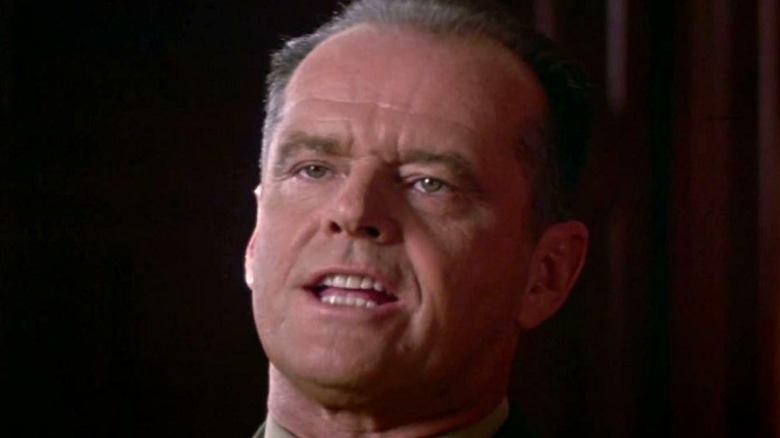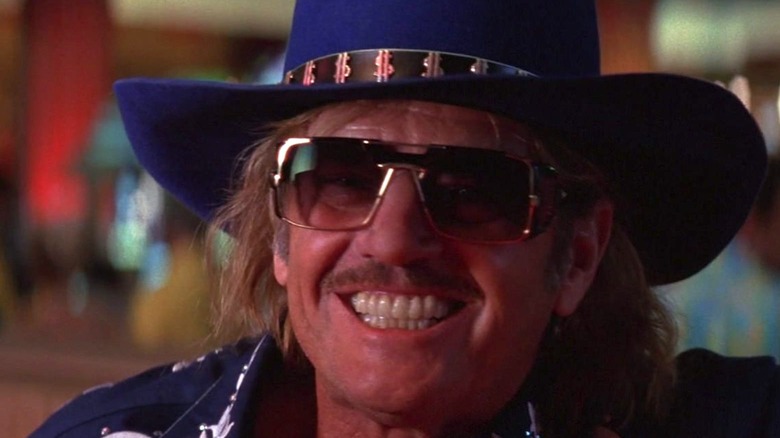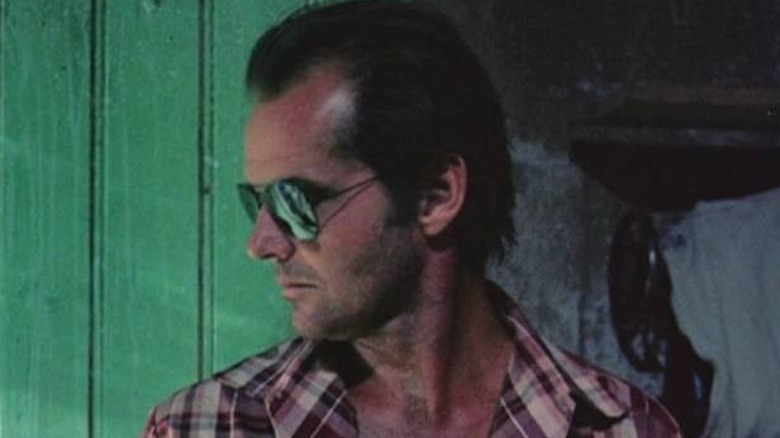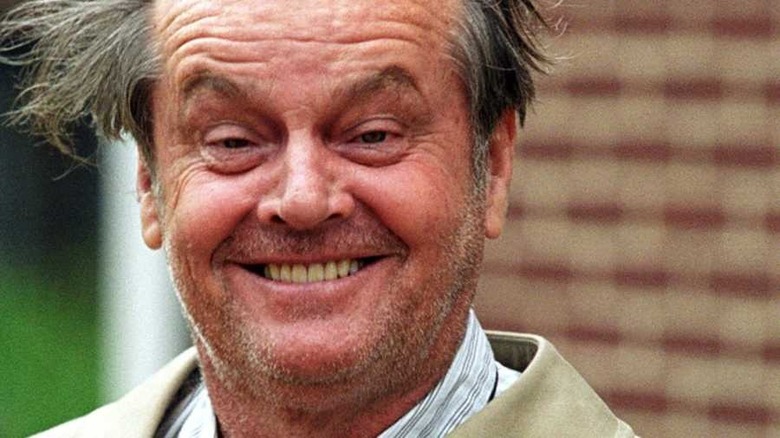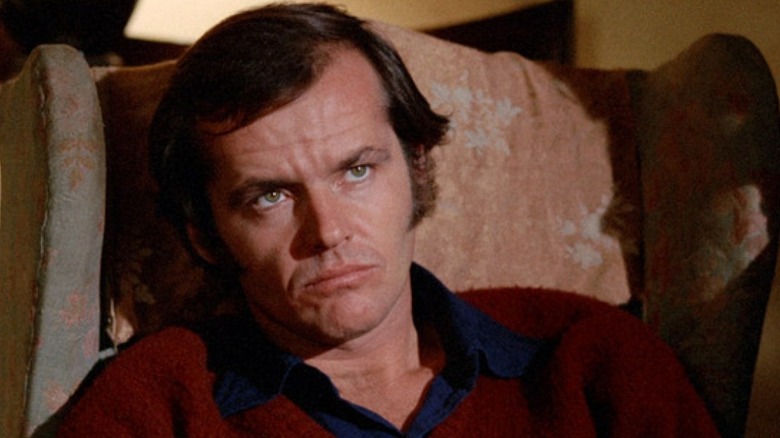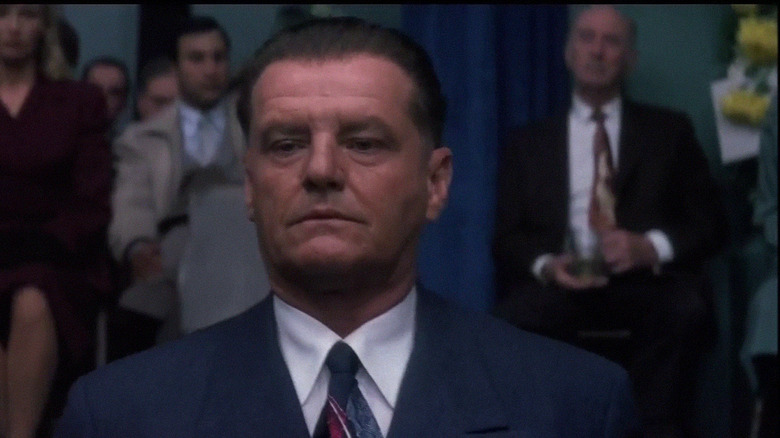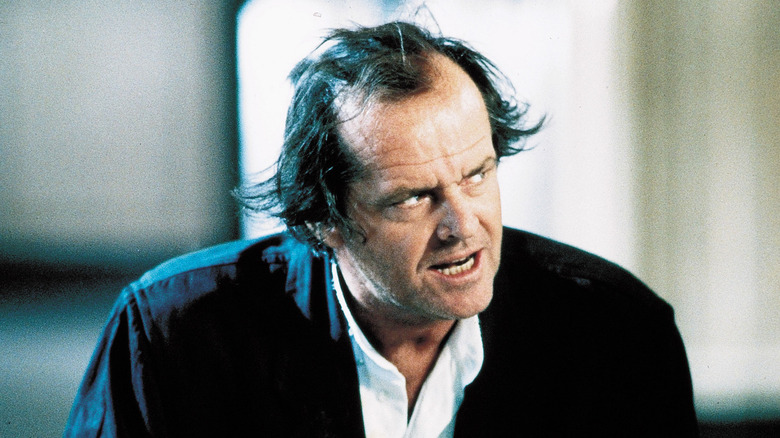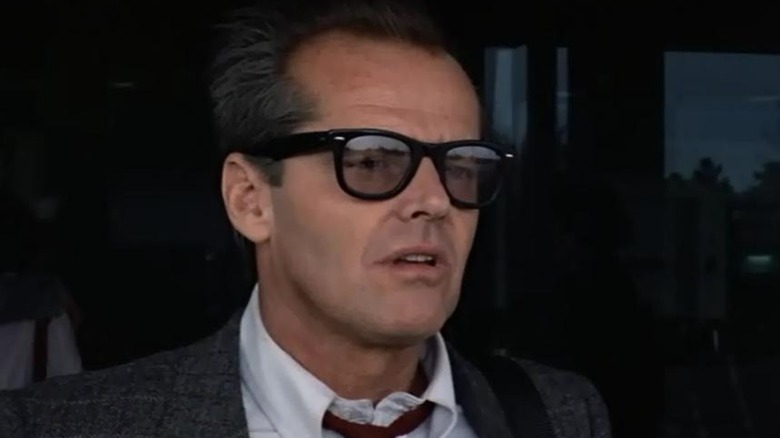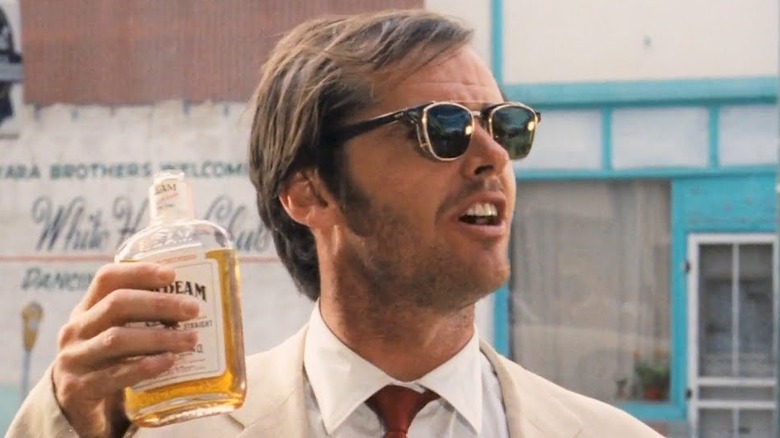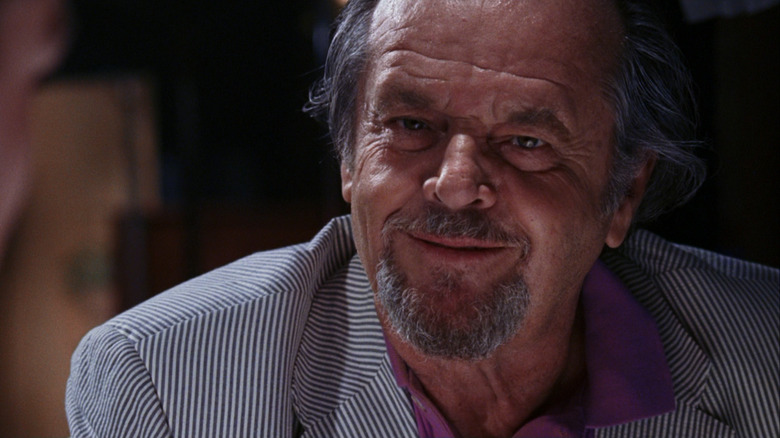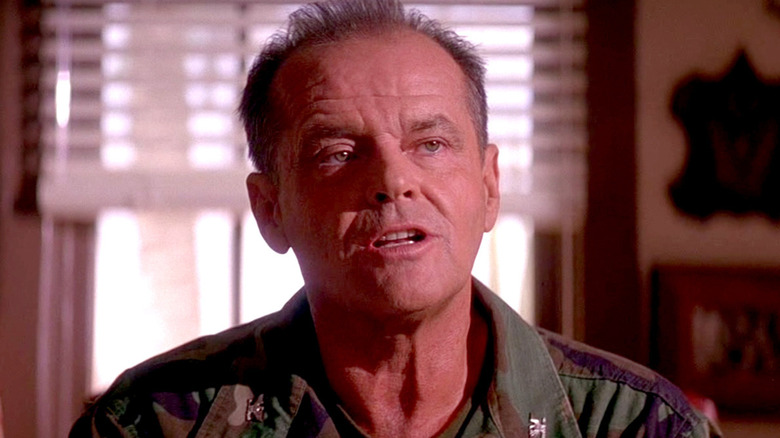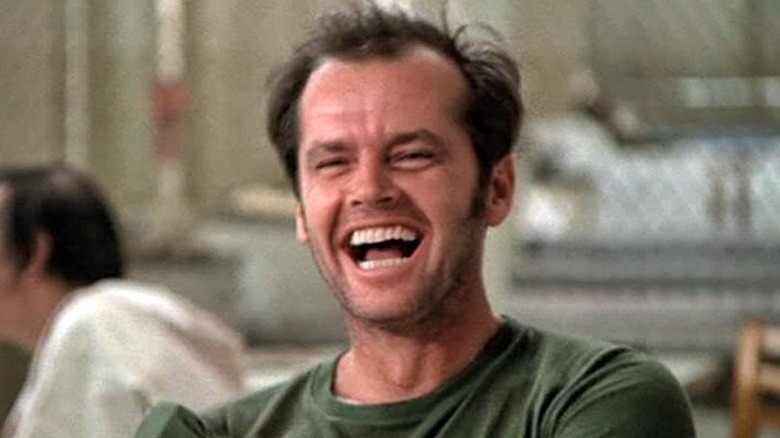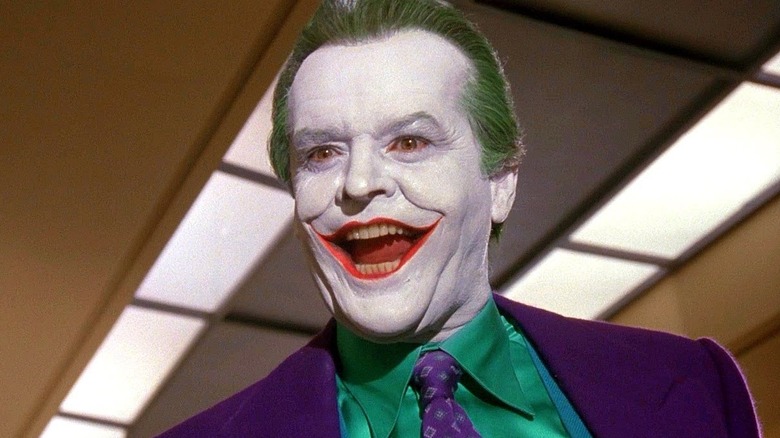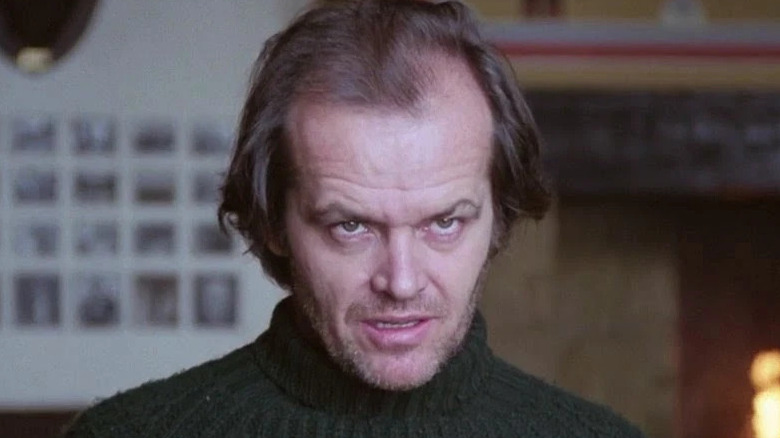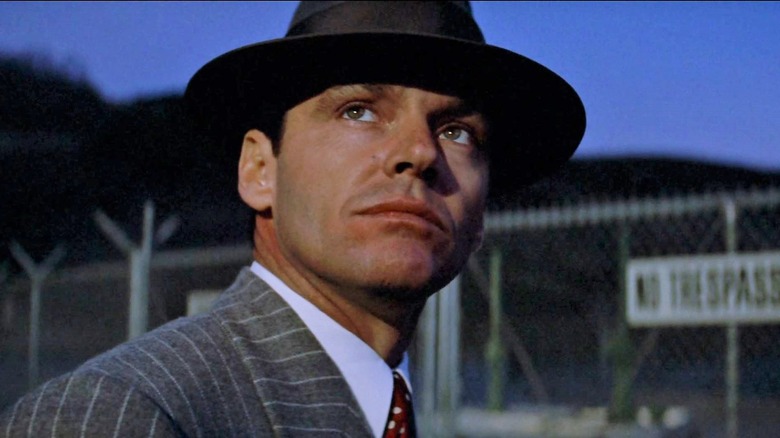Jack Nicholson's Best Movie Roles
Though he had a recurring role on the early medical TV drama "Dr. Kildare" and a memorable part in Roger Corman's "Little Shop of Horrors," Jack Nicholson didn't become a star until he was in his 30s, when he appeared in the seminal "Easy Rider." The 1969 film opened eyes to his acting genius, and Nicholson has since become one of the biggest and brightest stars in Hollywood. The superstar actor has had iconic roles across all genres. Tearjerkers, romances, crime dramas, thrillers, action flicks, comic book movies, comedies: He's done it all.
He excels at playing the tough, sinister, sometimes shadowy type, but as hard as some may have tried, he's never been able to be pigeon-holed. He has been everything from a wealthy, classically trained pianist to an aging drunk. He's been a crime fighter and a supervillain, a military soldier and a raving psychopath. With a career that has spanned more than 60 years, Jack Nicholson can proudly look back and say there isn't much he hasn't done. But if you're not familiar with his large body of work, where does one begin? Well, you're in luck, because we're here to run you through the list of his greatest roles.
Mars Attacks!
"Mars Attacks!" is perhaps Nicholson's most notorious film, not just because of its bizarre, satirical nature, but because the indomitable actor actually played two roles in the film: the President of the United States and an eccentric, smarmy Las Vegas hotelier named Art Land. Though he might be best remembered for the former, the latter is arguably the more impressive of the two characters.
The film, based on a series of Topps trading cards from the 1960s, was a black comedy from the mind of Tim Burton. With "Mars Attacks!," Nicholson proves just what a star he was: Even with a cast that includes Michael J. Fox, Danny DeVito, Glenn Close, Pierce Brosnan, and Annette Bening, he gets top billing. It's worth noting that in the role of the President, he's father to a pre-Star Wars Natalie Portman, who looks at her dad with bitter cynicism. Nicholson delivers a strong turn as the over-the-top world leader and exhausted father — and gives some of the movie's most memorable lines as President Dale. As Art Land, he hams it up even more, giving audiences one of the most ridiculous performances in a film filled with ridiculous performances. In "Mars Attacks!" Nicholson makes his mark twice, and for that alone it deserves a place on his list of best movie roles.
The Passenger
In "The Passenger," Nicholson inhabits the role of David Locke, a beleaguered journalist on assignment in the North African jungle looking for an interview with the rebel militants who operate there. Frustrated by the locals' unwillingness to help him, Locke is tired and dispirited, ready to call it quits. Looking for a new direction, he impulsively steals the identity of a dead man in his hotel and reports himself as the deceased ... only to later find that his new identity carries with it more problems than it solves.
Thanks to a contractual dispute, Nicholson was able to hold the rights to the movie himself, and he kept it out of circulation until 2005 when Sony Pictures acquired the rights from him and re-released it to theaters, prior to its first-ever DVD release. For this reason, South Florida Sun-Sentinel called the film "an enigmatic masterwork of modern cinema." Thanks in no small part to its long-delayed home release garnering extra attention, critics such as Roger Ebert have looked back on it with much more appreciation and enthusiasm than they had upon its debut in 1975, where it received a fairly mixed response. But in hindsight, with the few decades of perspective, it's been hailed as one of Nicholson's more impressive, haunting performances.
About Schmidt
"About Schmidt" is a 2002 comedy-drama telling the story of Warren Schmidt, a discontented former insurance agent who struggles to adjust to life in his twilight years, a transition made even worse by the sudden death of his wife. Schmidt begins to reassess his life, looking back with concern that he has achieved very little and has even less to look forward to. It's a relatable existential crisis, and he deals with it by taking a cross-country trek in a camper van to visit his daughter, stopping by important locales from his past along the way. Nicholson had made these sorts of "spiritual journey" movies before, but this one puts him in a unique role as a tired and aging widower.
"About Schmidt" was met with stellar reviews on its release, mainly thanks to the incredible performance of Nicholson in the role of the jaded Warren Schmidt, with The Guardian calling it a "tender, acrid masterpiece" and saying it was among the actor's finest roles. Far from the kinds of parts he's best been known for, like Jack Torrance, The Joker, or even Garrett Breedlove from the romantic comedy "Terms of Endearment," Nicholson's Warren Schmidt is not a larger-than-life figure, but instead a sympathetic everyman near the end of his life. It may indeed be among his best performances, and it's also possibly one of his most unique roles.
Five Easy Pieces
One of Jack Nicholson's most critically acclaimed films, "Five Easy Pieces" puts Nicholson in the role of Bobby Dupea, a grousing blue-collar laborer. The demoralized oil rig worker lives a dreary existence with a girlfriend he wishes to leave, often showing her coldness and taking out his bitterness on her in an attempt to drive her away.
But beneath the gruff exterior, we discover that Bobby grew up in a privileged home, from a family of wealth and means. Like "About Schmidt," Nicholson plays a man in the throes of disillusionment, but Bobby is not the world-weary Warren: He's a passionate, aggrieved man frustrated with his life, his relationship, and his friends, looking for new meaning. It's a portrait of a man without a soul, not because he lost it, but because he hasn't found it yet. "Five Easy Pieces" is a moving film about confronting one's past and oneself, and the choices we make in accepting the fortunes we are given. It was a timely picture in 1970, at a time of great upheaval, and right on the cusp of Nicholson's stardom.
Hoffa
In the 1992 film "Hoffa," Nicholson brings to life the infamous teamster and show-no-fear labor leader Jimmy Hoffa, who mysteriously disappeared in 1975, presumed murdered by his enemies in the Mafia. Told in flashback, the film portrays the sometimes violent early career of the young Hoffa, when he was an organizer and recruiter for the International Brotherhood of Teamsters, and his involvement with the Detroit Mafia's top dog, Carl D'Allesandro. It chronicles his conviction for a labor racketeering scheme and eventual pardon by President Nixon. The brilliance of the film, however, is that through Nicholson's performance, the film's direction by Danny DeVito, and strong script from David Mamet, it never condemns nor condones Hoffa, instead portraying him as a man willing to do anything to help his people, even if it meant bending the law.
It's the kind of crime drama that would be too far-fetched to be believable if it weren't based entirely on real events. Though it received mixed reviews from critics, Nicholson drew applause, with The Washington Post saying, "only Nicholson's beguiling personality could lend heft to such theatrics." Though it isn't one of his best movies, Nicholson's convincing portrayal of the legendary Hoffa — especially impressive under heavy makeup — is certainly one of the more memorable performances in a career laden with classic films.
The Witches Of Eastwick
By the mid-1980s, Jack Nicholson's career had reached a turning point: The actor was ready to embrace comedies and wackier characters like "The Witches of Eastwick" villain Daryl Van Horne. Directed by George Miller, the 1987 film is a dark comedy with a cast of star actresses including Cher, Michelle Pfeifer, and Susan Sarandon, with a score by Hollywood legend John Williams. Centered on three women who've lost their husbands and feel the depths of loneliness, the film soon reveals that the trio are actually witches in a powerful coven. When Nicholson's character arrives, he unexpectedly triggers the witches' latent supernatural powers — and insatiable sexual appetites — unleashing their sordid witchcraft on an unsuspecting little town.
"The Witches of Eastwick" was George Miller's first comedy, and it was certainly a successful debut in the genre for him after three three "Mad Max" movies with Mel Gibson. But it wouldn't have been possible without the wickedly incisive performance of Nicholson, who plays the devilish, aggressively sexual male figure in the overtly feminist-leaning tale. It's a movie with a heavy-handed message, one delivered with such gusto that it allows Nicholson to give one of the more ridiculous performances of his career.
Terms of Endearment
"Terms of Endearment" is one of the true '80s classics that tells the 30-year story of a mother and daughter's turbulent relationship. Shirley MacLaine plays the controlling and overbearing Aurora, a recently widowed middle-aged woman whose daughter Emma (Debra Winger) heavily resents her. When Emma marries and moves away, Aurora's relationship with her daughter continues to deteriorate. Jack Nicholson enters the picture as Garrett Breedlove, Aurora's former astronaut neighbor and frequent suitor. Over time, Aurora's closed nature softens, and the two begin dating, just as Emma's married life begins falling apart and the mother and daughter once again grow closer.
"Terms of Endearment" is the quintessential tearjerker, and Nicholson's chemistry with MacLaine's Aurora contributes heavily to the success of the film, with critics praising both actors for their performances. Nicholson is said to even have improvised some scenes himself, with MacLaine telling Fox411 that the actor's spontaneity brought the best out of them during filming. An achievement for Nicholson that gave him his second Oscar — this time for best supporting actor — the film was met with a positive reception and is hailed to this day as one of the best dramas of its kind in movie history. Nicholson would reprise the role a decade later in a sequel, "The Evening Star," with a bittersweet cameo.
Easy Rider
Jack Nicholson's part in the independent classic "Easy Rider" may not be his biggest role, but it might be one of his most notable, as the film and performance catapulted the actor to fame while at the same time marking a cultural shift in Hollywood. For his role as George Hanson in "Easy Rider," Nicholson would receive an Academy Award nomination, for best supporting actor, the first of many nominations that would ultimately see him take home three trophies.
Often considered one of the most influential movies of the '60s, "Easy Rider" is a low-budget road movie about a pair of so-called counter-culture "radicals" who travel the country by motorcycle. Nicholson's pivotal role as an uptight lawyer whom the radicals introduce to marijuana and alcohol serves as a crucial part of a film about youthful attitudes of the time, distrust of the establishment, and the burgeoning hippie culture.
The film owes a lot to Nicholson's award-winning role, and its success set in motion a new cinematic trend that became known as "New Hollywood": a flood of young filmmakers like Francis Ford Coppola, George Lucas, Steven Spielberg, John Carpenter, and many more. These new, young filmmakers would create films marked by rebellious themes, fresh and exciting filming techniques, and stories that expressed their struggle in the new American experience.
The Departed
"The Departed" marked the return of both Nicholson and filmmaker Martin Scorsese to the crime drama genre. It was a highly anticipated film, having assembled not just a legendary director in Scorsese, but a star-studded cast that included Leonardo DiCaprio, Matt Damon, Alec Baldwin, Martin Sheen, and Jack Nicholson as Irish mob boss Frank Costello.
In this remake of the 2002 Hong Kong action thriller "Infernal Affairs," we meet Billy Costigan (DiCaprio), a state trooper undercover in the Irish mob run by Costello (Nicholson). At the same time, Costello has sent his own lieutenant Colin Sullivan (Damon) to infiltrate the state police department, leading to a doubly tense situation for the two moles. It's a race against time for each to identify the other before they become exposed. "The Departed" would take home four Academy Awards that year including best picture, though Nicholson himself would not even be nominated. Nicholson's Costello is, however, one of the film's highlights, a larger-than-life, lecherous mafia boss that The Atlantic called "The Kingpin of Eastwick," recalling his previous role as Daryl Van Horne. Though not his best performance, Nicholson makes it an unforgettable one, turning Costello into one of the most talked-about Hollywood mafia men.
A Few Good Men
1992 was a banner year for Jack Nicholson, who would have three movies released, including "Hoffa," "Man Trouble," and the Aaron Sorkin-scripted film "A Few Good Men." The military courtroom drama directed by Rob Reiner was the best of the bunch, featuring a cast jam-packed with superstars. Tom Cruise, Demi Moore, Kiefer Sutherland, and Kevin Bacon were all at the height of their fame, and already onboard when producers were looking for another star to play the unscrupulous military base commander Colonel Jessup. The film certainly didn't need any more star power, but the producers got it when they cast Jack Nicholson, then a Hollywood legend, beating out James Woods for the part.
"A Few Good Men" sees Tom Cruise as a young naval lawyer defending a pair of U.S. Marines accused of the murder of a fellow officer. The two young soldiers claim they were acting under orders, and that the victim's death was accidental. It's a gripping courtroom drama, and Nicholson received rave reviews from critics and audiences alike, even getting an Academy Award nomination for his efforts. In their review of the film, The Hartford Courant said that Nicholson "seizes the drama between his sneering, snarling teeth." The review lauded the character of Jessup, who "played by Nicholson with rabid, macho pride, believes that his devotion to protecting the world puts him above the law."
One Flew Over The Cuckoo's Nest
"One Flew Over The Cuckoo's Nest" achieved a feat no movie had since 1934, sweeping all five of the Academy Awards' top honors: best picture, best director, best actress, best screenplay, and best actor. The last of these went to Jack Nicholson for his performance as Randle "R.P." McMurphy, an inmate at a mental institution. Suffice to say, the celebrated film is often considered among one of the best in movie history.
Adapted from the novel by Ken Kesey, "One Flew Over the Cuckoo's Nest" tells the story of convicted felon McMurphy, who is transferred to a state mental institution where he and a group of misfit patients rebel against the establishment ruled over by the tyrannical Nurse Ratched (best actress winner Louise Fletcher.) After the success of "Easy Rider," "Five Easy Pieces," and "Chinatown," Hal Ashby (then an early prospect for the role of director) was certain Nicholson was the right man to bring the troubled, eccentric patient to life, despite this being a very different kind of role for the budding star. And bring McMurphy to life he did: Nicholson's performance would help "One Flew Over the Cuckoo's Nest" go down as one of Hollywood's greatest films.
Batman
A motion picture based on the classic comic book superhero, "Batman" had been in the works throughout the 1980s after the success of Richard Donner's "Superman" in 1978, and the Joker was always destined to be the villain who would square off against the caped crusader. And while the casting of Michael Keaton caused considerable controversy when he was announced to play the title role, there was no such apprehension from fans when Nicholson took the role of the Clown Prince of Crime. Nicholson had been producer Michael Uslan's first choice since the early '80s before director Tim Burton was even involved, and his jaw-dropping performance as the infamous supervillain set a new standard for comic book baddies on screen, hailed to this day as one of the best performances in a comic book movie.
In Tim Burton's "Batman," Nicholson's raw talent is on full display: appropriately over the top, viciously uncompromising, his madness as the Joker completely uncontainable — and infectious too, figuratively and literally. It's hard to overstate just how important the film and Nicholson's part in it are to the genre of comic book films. For his role in the film, Nicholson asked for a portion of the film's earnings in lieu of a bigger up-front payday, something that paid massive dividends when the film set the record for biggest opening weekend at the box office. This practice has become an industry standard for Hollywood superstars.
The Shining
A horror movie classic from director Stanley Kubrick, "The Shining" was one of the first movies to bring the supernatural slasher genre to the mainstream. Adapted from the book by horror luminary Stephen King, Jack Nicholson takes on the role of Jack Torrance, a struggling writer who starts a new job as the caretaker of the Overlook Hotel while it's closed for the winter. Taking his wife and young son Danny, Jack hopes to use the time to work through a severe case of writer's block and finish his newest book. Unfortunately, his isolation, and outside supernatural forces, slowly drive him to madness.
Although heavily criticized by Stephen King himself (who famously preferred the critically maligned 1997 miniseries starring Steven Weber), "The Shining" is nothing short of a filmmaking masterpiece, a triumph for both Nicholson and Kubrick. Nicholson's towering performance as the psychotic Torrance and Kubrick's groundbreaking and stylish direction turn what could have been a rote thriller into a Hollywood classic, and one of the most memorable performances of Nicholson's career.
Chinatown
Nicholson's best role? It's Chinatown. Nicholson is Jake "J.J." Gittes, a successful private investigator who mostly snoops on cheating spouses and is hired by a woman to investigate the extramarital activities of her husband. As the investigation unfolds, Jake stumbles upon a broader conspiracy of corruption and betrayal that threatens to turn his life upside down.
"Chinatown" retained the look and feel of a 1940s detective movie, with critic Roger Ebert saying upon the film's release, "It accepts its conventions and categories at face value and doesn't make them the object of satire or filter them through a modern sensibility ... Here's a private-eye movie in which all the traditions, romantic as they may seem, are left intact." But Ebert didn't just celebrate the old-fashioned genre style: He heaped praise on the leading man, saying "it's also a triumph of acting, particularly by Jack Nicholson, who is one of the most interesting actors now working and who contributes one of his best performances." Like "One Flew Over the Cuckoos Nest," the neo-noir mystery is hailed as among the greatest films in motion picture history.
One of just two roles that he would return to, Nicholson would play Gittes again more than 15 years after "Chinatown" in "The Two Jakes," a 1990 crime drama that was well-received, but couldn't compare to its iconic predecessor.
